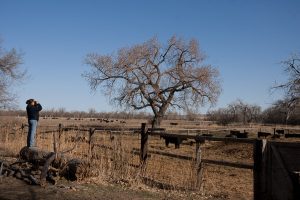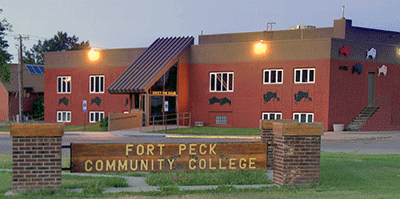Located in the northeastern corner of Montana about 450 miles from Bozeman, Fort Peck is home to the Assiniboine, Nakota, Lakota and Dakota people. The reservation consists of more than two million acres and is home to about 10,000 residents.
Activities
Agriculture is the primary economic driver on the reservation. Based in Poplar, Fort Peck extension is a collaborative effort between Montana State University, Fort Peck Community College and the Fort Peck Tribes. The primary goal is to address the needs to help sustain traditional Assiniboine and Sioux values and practices. Extension teaches life skills to youth and families, helping to foster healthy communities, schools and families in challenging communities.

Highlights
MEASURING IMPACT
“Most everybody here is a one-man office and the FRTEP agent happens to be the hub of all of us. There’s not really any of us that could survive or function…without [the agent] doing what she does. She helped put together management opportunities for our local farmers and ranchers as it relates to grazing management and accessibility to FSA programs. She brought speakers [to help us make] decisions to help us meet our goals, on weed control and soil health, as it relates to both rangeland and cropland crop diversity. An accomplishment is we have prescribed grazing plans on over 150,000 acres. It is the single largest project of its kind in Indian country anywhere.”
FRTEP programs have had a major impact on individuals, families and tribal communities. Just how much impact has now been quantified thanks to a research project that used Ripple Effects Mapping (REM) and content analysis. The Indian Land Tenure Foundation (ILTF) engaged in a joint collaboration with an evaluation team and the Western Extension Risk Management Education Center to measure the long-term impacts of the Federally Recognized Tribal Extension Program (FRTEP) serving Fort Peck. Click the link below to read the report.
Youth and family development
Fort Peck Extension serves seven communities across the reservation with a variety of school and community programs and events. From special celebrations such as Christmas, Halloween and Valentine’s to Wild West Days and the Wolf Point Stampede parade, there are numerous opportunities for youth to be involved.
One example is Progressive Agriculture Safety Day. For more than 20 years, this special event has combined education with hands-on activities that help youth learn how to be safe around farm activities. More than 400 students and 60 volunteers participate each year. Topics include safety related to grain, chemicals, water and bicycles, along with first aid. Students receive donated materials such as first aid kits, sunscreen, reflective arm bands, insect repellent and bike helmets. Other 4-H programs include camp, teacher training and 4-H fairs.
Market program for youth
The market program teaches youth how to raise an animal from start to finish. They learn about nutrition, quality assurance, animal welfare, food safety and other related activities. Much of the traditional knowledge about how to dress an animal has been lost. but youth are learning it through this program. Kids learn how to make fresh sausage, jerky, snack sticks and summer sausage. More than 250 participants have completed the course.
Tribal garden and pumpkin patch
The Fort Peck Tribes set aside 99 acres for a garden that is used for educational purposes. It has been used to grow numerous types of vegetables and pumpkins. Seeds and produce has been distributed to the community through the elder program, food bank and the kindergarten pumpkin patch.
Financial literacy program
Dozens of students and adults have completed financial literacy workshops which focus on what credit is, how to obtain it and how to use it positively. Educational games are used to reinforce learning objectives. Participants learn how to create a personal budget as well as how to complete job applications, prepare for interviews and build resumes.

Contact Information
Wendy Becker – Extension Educator
Phone Number
406-768-3451
wbecker@montana.edu